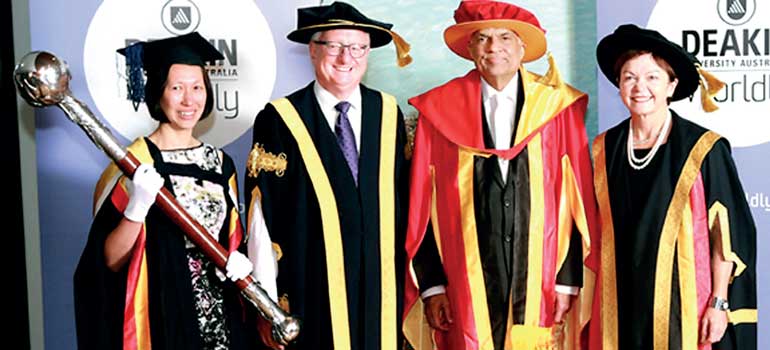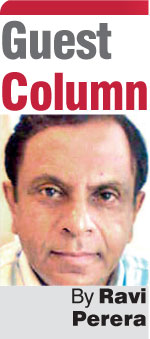Monday Feb 16, 2026
Monday Feb 16, 2026
Saturday, 4 March 2017 00:00 - - {{hitsCtrl.values.hits}}

Gamini is an inveterate day trader. He buys small quantities of shares at the stock market hoping that the price will move up during the day, enabling him to sell before the market closes in the afternoon, at a profit. For example, he may at 10 a.m. buy 5,000 shares of stock X at Rs. 20. By 2 p.m. stock X may reach Rs. 22. He will sell at that point, with a profit of Rs. 10,000 minus the brokerage on the transaction. 
Of course, everybody knows that trading in securities is not as simple. More often than not, the stock picked by Gamini ends up lower than the morning price. Yet he will sell the stock and use the money to buy another stock the next day.
There have been days when Gamini made impressive profits. On such days he is jaunty, boastful; suggesting that his winnings were due to clever stock picking and market timing. But most times, the stock ends up flat or lower. Gamini then goes quiet but is already thinking of his buy for the next day. It is said that a gambler is a person who makes his living out of hope. The hope of eventual profit, keeps Gamini going.
In his working days Gamini had been a senior executive in the private sector. Upon retirement he found time hangs heavy on him and decided on becoming an investor in the stock market, mainly to keep himself occupied, I suspect. He only invests small amounts, less than Rs. 50,000 at a time. I am not certain whether he is ahead in his investments but it seems unlikely for him to have done well in our somewhat topsy-turvy market.
Deakin doctorate
After a prolonged state of depression, for a few days last month our stock market picked up sharply. I met Gamini on one of those days. He had done well the previous day and was happy. I asked him what in his opinion made the market suddenly go up.
“I cannot tell. Our market is not based on any rationality. The only positive news I have heard is that our Prime Minister has been awarded an honorary doctorate by an Australian University. Maybe, that this bolstered investor confidence. Whatever the reason, I am very happy about market these days.”
It seems extremely irrational to lay the credit for a market upswing on the awarding of an honorary doctorate on the Prime Minister. Where there is no rational explanation for the happenings, events and developments in a country, it is not uncommon for the people to look to the irrational.
We both being non-academic types had no interest in further exploring the merits of the award by Deakin University to our veteran politician for his achievements in public life. Deakin University in Victoria, Australia is a world away from our life experiences. However, it made me wonder what the reaction of the Australian Prime Minister (and public) would have been had one of our universities, say Sri Jayewardenepura University, deemed it ought to reciprocate the honour.
It would have not been too difficult to find merit in the Prime Minister from down under; Australia scoring very high in indexes such as quality of life, perception of corruption (the absence of it), integrity of systems, democratic political culture and so on; the politicians or the culture have obviously got certain things right there.
But such a move by the University in suburban Colombo to turn Malcolm Turnbull into Dr. Malcolm Turnbull would have been met with incredulity in Canberra, as a tasteless attempt at patronising. A funny situation of a recipient race, assessing the aid giver; a target country for desperate immigrants being recognised by the country they run away from!
Good wine needs no bush, they don’t need our praise.
Presently, in little Sri Lanka, it seems there are “doctors” and “doctors”; and there is no getting away from them.
In the second class of doctors, we have those with degrees in Western medicine and registered to practice as such. Where this form of medical care evolved, the courtesy title “Dr” is widely accepted as a form of addressing medical practitioners.
However, the first official recognition of ‘Doctor’ being applied as a title to medical practitioners, regardless of whether they held a doctoral degree was in 1838, when the Royal College of Physicians resolved that it would ‘regard in the same light, and address by the same appellation, all who have obtained its diploma, whether they have graduated elsewhere or not’.
Historical perspective
To put this (1838) in historical perspective, it is useful to remind ourselves of the fact that the Colebrook Cameron Commission reforms (1831-2)which set us on the journey from the old to the new were only a few years before. In the view of the Colebrook Commissioners the old ‘Rajakariya’ system in the island tied the people to the land and could not change their occupations and therefore could not take to new crafts or new types of work. Even the practice of native medicine, was a family tradition.
In England, like the Thames, the medical profession flowed forward. The Medical Act of 1858 made it illegal for anyone not qualified in medicine to use the title Dr. A forward-looking people keep changing and improving. While various changes were being made to the formalities of address, the substance, the quality of its medical services kept advancing, acquiring an international repute. Today there are many medical schools in the United Kingdom, most private and fee levying. But the English, the institution builders that they are, have maintained high standards, with regulatory bodies that would not let their guard down.
One time, London’s Harley Street was synonymous with the best medical services available in the world. One may pay lip service to an idea but it is with your feet that the real voting takes place. In the past, almost all our rich and famous went to London for medical attention. London was the chosen destination of D.S. Senanayake, our first Prime Minister, whenever he felt like a medical check-up. This was followed by most of his successors in politics, including N.M. Perera, the Trotskyite. By the way, an educational qualification from England was open sesame to any Sri Lankan institution; social, political or economic. In the former colony, there were no counter values that could substitute effectively.
Since of late, other international medical centres have come in vogue, America, Australia and of course Singapore leading. Primarily, the credit for these developments should go to private sector initiatives and of course the supportive vision of the respective governments of those countries. Even when one of our young cricketers pulls a muscle badly, it is to Australia that he will go for help. Today, almost anybody with the means will fly to Singapore even if the ailment is of a minor nature. It is said that you can meet more Sri Lankan politicians at Singapore’s up-market Mt. Elizabeth Hospital than at our Parliament library.
Recently, one former Health Minister took ill and was flown immediately to Singapore, “You cannot take a chance on these things, no!” The Minister had more than 100 visitors from Sri Lanka at the bedside during his stay at the plush hospital. Only last week there was a news item that even our hard-working Defence Secretary was flown to Singapore for medical attention. He by no means looks like a person who blindly follows anything foreign. But when a person is unwell, surely he is entitled to the best attention that is available in the world.
There is no denying that the greatest hope of the vast majority our doctors and even present medical students would be that one day their children would have the opportunity to study in a Western country, still better, live there; an opportunity denied to the father by circumstances.
SAITM and standards
It is argued that the medical degree awarded by SAITM, a private medical school, is not up to the required standard while the degree awarded by the Government run medial colleges are of a high standard. With the former assertion, we can sympathise; after all there is hardly any institution or idea that has not been degraded or diminished in this country. We cannot trust that just one institution, whether it is SAITM or any other, can buck the trend in a sea of corruption and decay.
However, as to the latter assertion about high standards, the sample group; those who seek treatment from the doctors produced by our medical colleges, are handicapped, as they can only speak of one category of doctors. Perhaps, we should ask those who have had the experience of receiving medical care from two systems, Sri Lanka as well as Singapore, for their comparative assessment. Here, we have the advantage of having a large sample group: a former Health Minister, a Defence Secretary and many other politicians and business magnets.
Tolstoy thought all happy families are alike; while each unhappy family is unhappy in its own way. Perhaps, each unhappy nation is also unhappy in its own way.